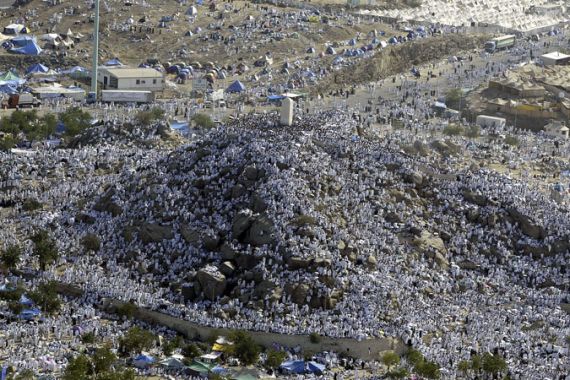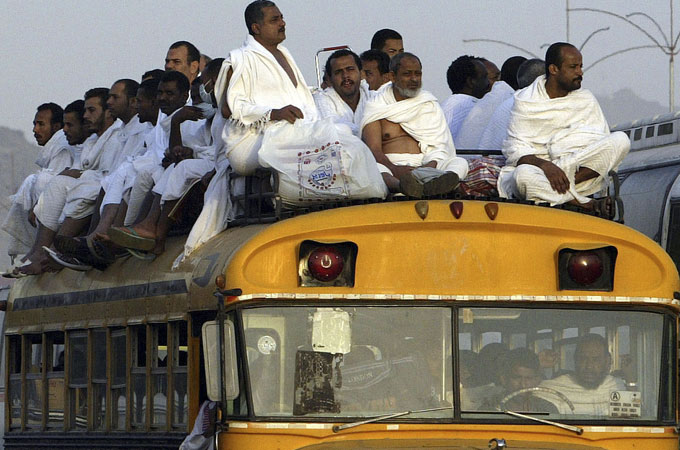Calling on Muslims to make Hajj greener
Hajj is the largest pilgrimage on the planet, but if it is to endure, environmentally-friendly measures are needed.

 |
| Pilgrims journey on a bus towards Arafat for the culmination of the Hajj rituals [Getty Images] |
According to the Quran, humans are entrusted to be the maintainers of the earth and the only species able to burden this responsibility. If there is any place on the planet to which Muslims should offer this protection, surely it should be their holiest sites of Mecca and Medina?
However, during the Islamic pilgrimage, Hajj, most Muslims have to sidestep plastic bottles, used diapers and food packaging in order to complete their pilgrimage.
Keep reading
list of 4 itemsAre seed-sowing drones the answer to global deforestation?
Rainfall set to help crews battling wildfire near Canada’s Fort McMurray
The Alabama town living and dying in the shadow of chemical plants
Kristiane Backer, a television presenter, author and eco-Muslim, explains that “most Muslims are not aware of the innate nature of environmentalism within Islam, just as, generally, most people aren’t aware of the importance of protecting the environment”.
According to Backer, shedding cultural attitudes and ecological indifference is vital in developing a sustainable Hajj.
In order for pilgrims to fulfil their religious obligation, without jeopardising their responsibility to the environment, local Saudi authorities might consider offering recycling points for food containers and installing drinking fountains in key areas.
But litter is not the only obstacle to a more sustainable Hajj. Nearly three million Muslims perform Hajj each year, a pilgrimage which is required once of all able-bodied Muslims who can afford it. Many Muslims complete Hajj several times, travelling thousands of miles by airplane in order to duplicate an experience that is required only once.
Excessive pilgrimages
Rianne ten Veen, a Muslim environmentalist, is concerned about the number of times that people complete Hajj.
“Several of the people I met there asked, ‘How many times have you been? Only once?… This is my fifteenth time’.” She adds, “But this is supposed to be a journey of a lifetime.”
A century ago, when more eco-friendly transport was still widely used and the number of pilgrims was far lower, repeat trips might have been understandable, if less practical.
But today, pilgrims – particularly those who live far from Saudi Arabia – should consider the ecological damage caused every time they fly several thousand miles to Mecca. The Muslim Prophet only completed Hajj once and if a single trip was adequate for him, it should be sufficient to those who wish to mirror him.
Multiple pilgrimages are excessive and unnecessary, particularly if pilgrims stay in five-star lodgings. This is often considered the ultimate Hajj experience, coupling spirituality with luxury.
But money wasted on penthouse suites and yearly pilgrimages could be better spent on helping people who have yet to complete the pilgrimage to fulfil the fifth pillar of Islam.
‘Green’ Muslims
Othman Llywellyn, Environmental Planner for the Saudi Wildlife Commission, believes that nowhere should be more preserved by Muslims than the holy sites in Saudi Arabia. “Mecca and Medina are the primordial protected areas of Islam,” he says.
Llywellyn explains that, according to Islam, there are regulations which require Muslims to treat all creatures in the two inviolable sanctuaries with the greatest care. “We are not to destroy any of the native trees or vegetation, nor kill, injure, or disturb wild animals.”
A failure to ensure that these areas are protected is setting a poor example to the millions of pilgrims who flock to Saudi Arabia every year. Llewellyn believes that this disregard for Islamic duty towards God’s creation sends a clear and damaging message to pilgrims, “that it is okay to destroy the ground of the most sacred places on Earth”.
Rianne ten Veen has found many Muslims to be dismissive of conservation. “I find it hard to comprehend why Muslims can’t see the blatant messages. If environmental issues weren’t important, why are so many chapters of the Quran named after elements of the environment? The longest chapter is even named after a cow.”
Fortunately, an increasing number of Muslims are mobilising to raise awareness about sustainability. Sarah Jawaid organises the Washington-based group DC Green Muslims. “I think that young Muslims are more conscious of the environment; they have a sense of wanting to protect it,” she says.
An increasing number of American Muslims have been mobilising green groups around the country, with one mosque in Bridgeview, Chicago even installing solar panels to power the building.
Last Hajj, two young South African Muslims made the voyage from Cape Town to Mecca in an entirely sustainable way – by bicycle. Nathim Cairncross and Imtiyaz Ahmad Haron cycled almost 11,000km over the course of nine months.
Cairncross explains that “cycling is very much connected to the environment,” allowing the cyclist to “interact with nature”.
Making Hajj sustainable
Some initiatives have emerged from Saudi Arabia itself, with an underground metro easing the pressure on cars and buses. They have also imposed a time restriction before which – in theory – Muslims are not allowed to repeat the pilgrimage.
The population of Mecca and Medina almost doubles during Hajj and the number of pilgrims rises annually, reflecting the growth of the global Muslim population.
If Hajj is to survive as pilgrimage, further steps must be taken by both pilgrims and local authorities. The result would not only have a profound effect on the ecosystem, making Hajj more sustainable and manageable, but would also be the ideal platform to advocate the ecological character of Islam.
A prophetic tradition instructs Muslims to use water sparingly, even if they are cleaning themselves right next to a river. Despite clear examples to the contrary, conservation is widely considered to be a modern spin on Islam, or even completely unconnected. But nowhere should be more valued and protected by the “maintainers of the Earth” than Mecca and Medina.
From recycling water bottles and disposing of waste responsibly to travelling to Hajj by boat or bus, there is both opportunity and imperative. If all else fails, Muslims could just pick up a bicycle, like Cairncross and Haron.
Ruqaya Izzidien is a freelance journalist.
The views expressed in this article are the author’s own and do not necessarily reflect Al Jazeera’s editorial policy.